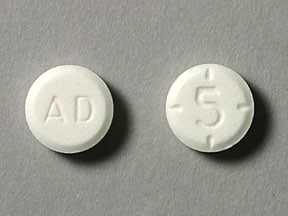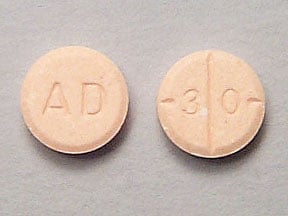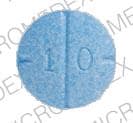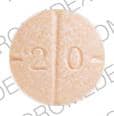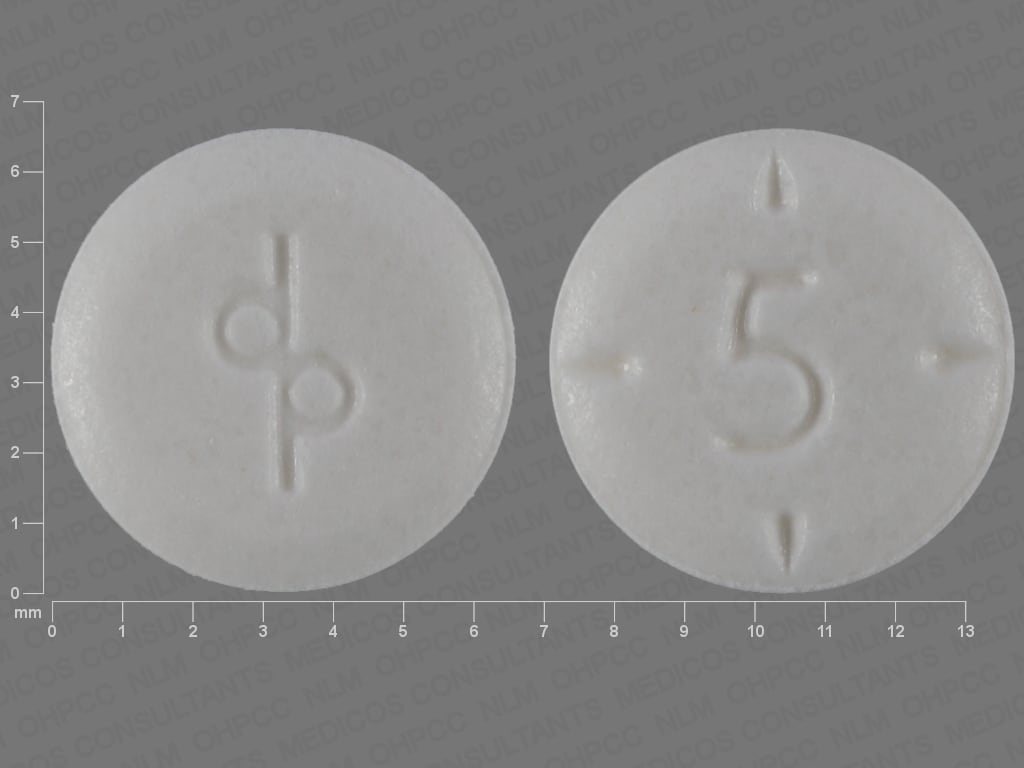What is Adderall?
Adderall is a central nervous system stimulant prescription medicine. It is used for the treatment of attention-deficit hyperactivity disorder (ADHD). Adderall may help increase attention and decrease impulsiveness and hyperactivity in patients with ADHD.
Adderall should be used as a part of a total treatment program for ADHD that may include counseling or other therapies.
Adderall is also used in the treatment of a sleep disorder called narcolepsy.
Adderall is a federally controlled substance (CII) because it can be abused or lead to dependence. Keep Adderall in a safe place to prevent misuse and abuse. Selling or giving away Adderall may harm others, and is against the law. Tell your doctor if you or your child have (or have a family history of) ever abused or been dependent on alcohol, prescription medicines or street drugs.
What is the most important information I should know about Adderall?
The following have been reported with use of Adderall and other stimulant medicines.
1. Heart-Related problems
- sudden death in patients who have heart problems or heart defects
- stroke and heart attack in adults
- increased blood pressure and heart rate
Tell your doctor if you or your child have any heart problems, heart defects, high blood pressure, or a family history of these problems.
Your doctor should check you or your child carefully for heart problems before starting Adderall.
Your doctor should check your or your child’s blood pressure and heart rate regularly during treatment with Adderall.
Call your doctor right away if you or your child have any signs of heart problems such as chest pain, shortness of breath, or fainting while taking Adderall.
2. Mental (psychiatric) problems
All patients
- new or worse behavior and thought problems
- new or worse bipolar illness
- new or worse aggressive behavior or hostility
Children and teenagers
- new psychotic symptoms (such as hearing voices, believing things that are not true, are suspicious) or new manic symptoms
Tell your doctor about any mental problems you or your child have, or about a family history of suicide, bipolar illness, or depression.
Call your doctor right away if you or your child have any new or worsening mental symptoms or problems while taking Adderall, especially seeing or hearing things that are not real, believing things that are not real, or are suspicious.
3. Circulation problems in fingers and toes [peripheral vasculopathy, including raynaud’s phenomenon]
- Fingers or toes may feel numb, cool, painful
- Fingers or toes may change color from pale, to blue, to red
Tell your doctor if you have or your child has numbness, pain, skin color change, or sensitivity to temperature in your fingers or toes.
Call your doctor right away if you have or your child has any signs of unexplained wounds appearing on fingers or toes while taking Adderall.
Who should not take Adderall?
Adderall should not be taken if you or your child:
- have heart disease or hardening of the arteries
- have moderate to severe high blood pressure
- have hyperthyroidism
- have an eye problem called glaucoma
- are very anxious, tense, or agitated
- have a history of drug abuse
- are taking or have taken within the past 14 days an anti-depression medicine called a monoamine oxidase inhibitor or MAOI.
- are sensitive to, allergic to, or had a reaction to other stimulant medicines
Adderall is not recommended for use in children less than 3 years old.
What should I tell my healthcare provider before taking Adderall?
Adderall may not be right for you or your child. Before starting Adderall tell your or your child’s doctor about all health conditions (or a family history of) including:
- heart problems, heart defects, high blood pressure
- mental problems including psychosis, mania, bipolar illness, or depression
- tics or Tourette’s syndrome
- liver or kidney problems
- circulation problems in fingers and toes
- thyroid problems
- seizures or have had an abnormal brain wave test (EEG)
Tell your doctor if you or your child are pregnant, planning to become pregnant, or breastfeeding.
Can Adderall be taken with other medicines?
Tell your doctor about all of the medicines that you or your child take including prescription and nonprescription medicines, vitamins, and herbal supplements. Adderall and some medicines may interact with each other and cause serious side effects. Sometimes the doses of other medicines will need to be adjusted while taking Adderall.
Your doctor will decide whether Adderall can be taken with other medicines.
Especially tell your doctor if you or your child take:
- anti-depression medicines including MAOIs
- blood pressure medicines
- seizure medicines
- blood thinner medicines
- cold or allergy medicines that contain decongestants
- stomach acid medicines
Know the medicines that you or your child take. Keep a list of your medicines with you to show your doctor and pharmacist.
Do not start any new medicine while taking Adderall without talking to your doctor first.
How should I take Adderall?
- Take Adderall exactly as prescribed. Your doctor may adjust the dose until it is right for you or your child.
- Adderall tablets are usually taken two to three times a day. The first dose is usually taken when you first wake in the morning. One or two more doses may be taken during the day, 4 to 6 hours apart.
- Adderall can be taken with or without food.
- From time to time, your doctor may stop Adderall treatment for a while to check ADHD symptoms.
- Your doctor may do regular checks of the blood, heart, and blood pressure while taking Adderall. Children should have their height and weight checked often while taking Adderall. Adderall treatment may be stopped if a problem is found during these check-ups.
- If you or your child take too much Adderall or overdose, call your doctor or poison control center right away, or get emergency treatment.
What are possible side effects of Adderall?
See “What is the most important information I should know about Adderall?” for information on reported heart and mental problems.
Other serious side effects include:
- slowing of growth (height and weight) in children
- seizures, mainly in patients with a history of seizures
- eyesight changes or blurred vision
- serotonin syndrome. A potentially life-threatening problem called serotonin syndrome can happen when medicines such as Adderall are taken with certain other medicines. Symptoms of serotonin syndrome may include:
- agitation, hallucinations, coma or other changes in mental status
- problems controlling your movements or muscle twitching
- fast heartbeat
- high or low blood pressure
- sweating or fever
- nausea or vomiting
- diarrhea
- muscle stiffness or tightness
Common side effects include:
- stomach ache
- decreased appetite
- nervousness
Adderall may affect your or your child’s ability to drive or do other dangerous activities.
Talk to your doctor if you or your child have side effects that are bothersome or do not go away.
This is not a complete list of possible side effects. Ask your doctor or pharmacist for more information.
Call your doctor for medical advice about side effects. You may report side effects to FDA at 1-800-FDA-1088.
Adderall Images
Drug Interactions
A total of 220 medications are known to interact with Adderall. Use the Interactions Checker Tool.
Common Interactions Checks
General information about the safe and effective use of Adderall
Medicines are sometimes prescribed for purposes other than those listed in a Medication Guide. Do not use Adderall for a condition for which it was not prescribed. Do not give Adderall other people, even if they have the same condition. It may harm them and it is against the law. This Medication Guide summarizes the most important information about Adderall. If you would like more information, talk with your doctor. You can ask your doctor or pharmacist for information about Adderall that was written for healthcare professionals. For more information about Adderall please contact Teva Pharmaceuticals at 1-888-838-2872.
How should I store Adderall?
- Store Adderall in a safe place at room temperature, 20° to 25°C (68° to 77°F).
- Keep Adderall and all medicines out of the reach of children.
What are the ingredients in Adderall?
Active Ingredient: dextroamphetamine saccharate, amphetamine aspartate, dextroamphetamine sulfate and amphetamine sulfate.
Inactive Ingredients: colloidal silicon dioxide, compressible sugar, corn starch, magnesium stearate, microcrystalline cellulose and saccharin sodium. The 5 mg is a white to off-white tablet, which contains no color additives. The 7.5 mg and 10 mg also contain FD&C Blue #1 Aluminum Lake as a color additive. The 12.5 mg, 15 mg, 20 mg and 30 mg also contain FD&C Yellow #6 Aluminum Lake as a color additive.

